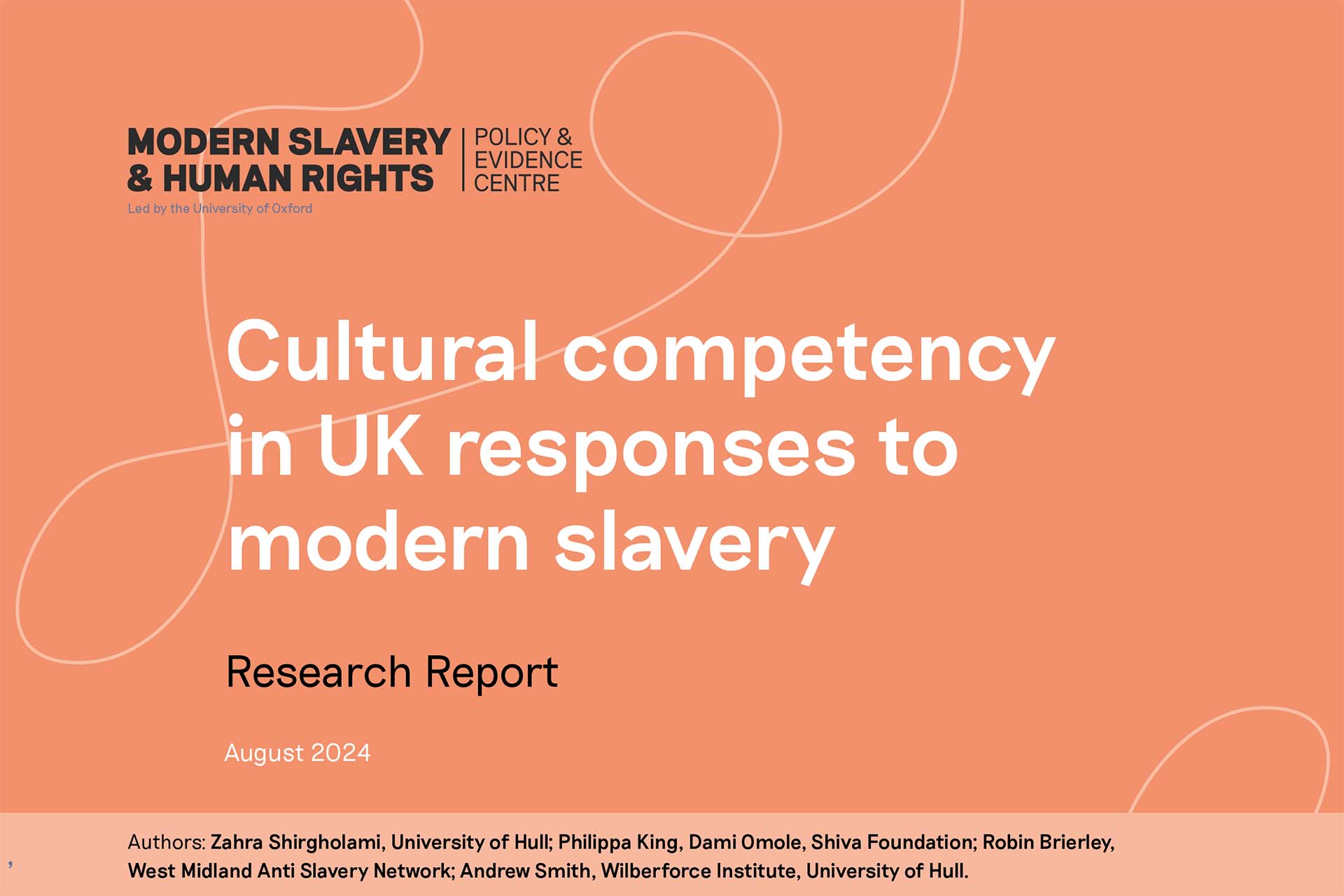Report
Cultural competency in UK responses to modern slavery

Research assessing the value of cultural competency in responses to modern slavery in the UK.
This is a report and the summary of the report: Cultural Competency in UK Responses to Modern Slavery, based on research we conducted with the University of Hull and West Midlands Anti Slavery Network.
Background
This project seeks to assess the value of cultural competency and practices in improving equity and effectiveness in prevention, legal enforcement, support services and identification of those affected by modern slavery. Cultural competency and structural competency originated in the US healthcare sector in response to disparities in medical care availability and treatment based on cultural differences. This research is one of the first to explore whether and how it could be applied in UK responses to modern slavery for those facing identity-based oppression based on protected characteristics.
Key findings
The findings reveal barriers for the survivors of modern slavery to access support created by a lack of cultural and structural competency at micro/individual, meso/organisation and macro/policy and legislation levels. The identified barriers particularly affect those who may face discrimination based on protected characteristics: age, disability, gender assignment, marriage and civil partnership, pregnancy and maternity, race, sex, and sexual orientation. The research also identified means by which support providers have attempted to remove these barriers. It is important to note that barriers at the three levels are interconnected and may overlap.
- At the micro level, the research identified the individual-level challenges that one may face that could make them vulnerable to exploitation or when attempting to leave an exploitative situation.
- At the meso/organisational level, the research identified professionals’ stigma and stereotypes towards potential victims of modern slavery, as well as their limited engagement and action and inflexibility of systems as barriers to early identification and prevention of harm.
- At the macro/legal and policy level, our research found that current immigration policies and political narratives, structural discrimination, and the complexity of the NRM support system have significant negative impacts on survivors’ ability to access support and protection.
- The research found that culturally and structurally competent approaches to service delivery are most effective when barriers at all three levels are recognised and addressed.
Recommendations
Recommendation 1: Embed culturally competent approaches. The research findings suggest that an understanding of how diverse cultural backgrounds can impact vulnerability and exploitation may improve the effectiveness of support provision and responses to exploitation risk.
Local-level statutory and non-statutory agencies should consider embedding culturally competent approaches into their in-house or commissioned training and development programmes. The Home Office Modern Slavery Unit should consider a robust review of current First Responder training, embedding culturally competent language and information, and making First Responder training mandatory for all relevant organisations.
Recommendation 2: Build trust and confidence in authorities. The responses from the interviews and focus groups indicate that efforts should be made at all levels from Central Government to statutory and non-statutory local actors to address the widespread mistrust of authorities in the UK.
In part, this can be achieved by organisations who interact with survivors (as victims of crime, as service users, or in other capacities) systematically monitoring and evaluating their approach. This includes by collecting and acting upon feedback from individuals impacted by modern slavery.
Recommendation 3: Increase awareness among victims of their rights. The research findings indicate that there is a lack of awareness among individuals who are being exploited about their rights and the support systems available to them, such support provided through the Modern Slavery Victim Care Contract (MSVCC) as part of the NRM. Ensuring those experiencing modern slavery are aware of their rights and entitlements and have trust in authorities (see recommendation 2) will empower individuals to seek help and prevent further harm.
To do this, the Home Office Modern Slavery Unit and the Director of Labour Market Enforcement could jointly interrogate and improve the flow of information to at-risk groups, including through partnership with local community groups.
Recommendation 4: Increase awareness of cultural barriers to support. During the interviews and focus groups, most participants talked about how professionals sometimes tend to stigmatise and stereotype potential victims of modern slavery and survivors. They also explained survivors’ profound feelings of shame and language barriers throughout their engagement with a broad range of support services, both statutory and non-statutory, as well as with everyday issues such as opening a bank account or visiting a doctor, for example.
- Local-level advisory panels and working groups composed of people with lived experience of modern slavery may help to address this issue, by bringing together those who have faced these challenges to support and guide local actors to amend their services and policies to be more culturally competent. Research and programme funders should consider making funding pathways available for organisations seeking to build and maintain these panels and groups, and civil society organisations should consider prioritising establishing internal panels and groups.
- All Modern Slavery Victim Care Contract service providers (safehouse and reach-in) should have access to interpreters to facilitate effective communication and prevent re-traumatisation as outlined in Annex F of the relevant Statutory Guidance. Modern slavery partnerships and networks could consider prioritising supporting organisations to work together to share resources and ensure access to interpretation services when needed.
Recommendation 5: Address the Inflexibility of Systems. The research indicates that addressing vulnerabilities has become automated and commodified, causing individuals, their identities, and backgrounds to get lost within the system. This can lead to a cold and impersonal approach, which is the opposite of the antecedents and attitudes of culturally competent practices. Responses by participants support our assertion that many systems cannot adapt to meet the needs of these diverse communities. The responses from both those with lived experience and practitioner focus groups indicate that digital systems such as online application forms and websites should be significantly revised and updated to be more accessible to non-English speaking people and people with disabilities.
To achieve this, Government Departments, local authorities, banks, NHS Digital, and other service providers should incorporate the perspectives and experiences of people from diverse backgrounds into the user research that informs the design of such systems.
Recommendation 6: Embed Cultural Competency into the Public Health Approach to Modern Slavery. A public health approach to modern slavery offers an opportunity to coordinate efforts across the anti-slavery sector. The public health approach has been successfully applied in response to domestic abuse and sexual violence and is a good practice example of an equitable multi-agency approach. This approach should include micro, meso, and macro-level factors, engaging actors across government, victim care contract providers, lived experience panels/advisory groups and local statutory and non-statutory partners. This approach also builds on the existing good practice displayed by the many anti-slavery partnerships across the UK. Properly supported and funded by the Home Office, these partnerships would be ideally placed to drive culturally competent multi-agency working that not only addresses victim identification and support but also prevention and disruption.
Please fill in the details below to access the Summary & Report.
Report
Cultural competency in UK responses to modern slavery

Research assessing the value of cultural competency in responses to modern slavery in the UK.
This is a report and the summary of the report: Cultural Competency in UK Responses to Modern Slavery, based on research we conducted with the University of Hull and West Midlands Anti Slavery Network.
Background
This project seeks to assess the value of cultural competency and practices in improving equity and effectiveness in prevention, legal enforcement, support services and identification of those affected by modern slavery. Cultural competency and structural competency originated in the US healthcare sector in response to disparities in medical care availability and treatment based on cultural differences. This research is one of the first to explore whether and how it could be applied in UK responses to modern slavery for those facing identity-based oppression based on protected characteristics.
Key findings
The findings reveal barriers for the survivors of modern slavery to access support created by a lack of cultural and structural competency at micro/individual, meso/organisation and macro/policy and legislation levels. The identified barriers particularly affect those who may face discrimination based on protected characteristics: age, disability, gender assignment, marriage and civil partnership, pregnancy and maternity, race, sex, and sexual orientation. The research also identified means by which support providers have attempted to remove these barriers. It is important to note that barriers at the three levels are interconnected and may overlap.
- At the micro level, the research identified the individual-level challenges that one may face that could make them vulnerable to exploitation or when attempting to leave an exploitative situation.
- At the meso/organisational level, the research identified professionals’ stigma and stereotypes towards potential victims of modern slavery, as well as their limited engagement and action and inflexibility of systems as barriers to early identification and prevention of harm.
- At the macro/legal and policy level, our research found that current immigration policies and political narratives, structural discrimination, and the complexity of the NRM support system have significant negative impacts on survivors’ ability to access support and protection.
- The research found that culturally and structurally competent approaches to service delivery are most effective when barriers at all three levels are recognised and addressed.
Recommendations
Recommendation 1: Embed culturally competent approaches. The research findings suggest that an understanding of how diverse cultural backgrounds can impact vulnerability and exploitation may improve the effectiveness of support provision and responses to exploitation risk.
Local-level statutory and non-statutory agencies should consider embedding culturally competent approaches into their in-house or commissioned training and development programmes. The Home Office Modern Slavery Unit should consider a robust review of current First Responder training, embedding culturally competent language and information, and making First Responder training mandatory for all relevant organisations.
Recommendation 2: Build trust and confidence in authorities. The responses from the interviews and focus groups indicate that efforts should be made at all levels from Central Government to statutory and non-statutory local actors to address the widespread mistrust of authorities in the UK.
In part, this can be achieved by organisations who interact with survivors (as victims of crime, as service users, or in other capacities) systematically monitoring and evaluating their approach. This includes by collecting and acting upon feedback from individuals impacted by modern slavery.
Recommendation 3: Increase awareness among victims of their rights. The research findings indicate that there is a lack of awareness among individuals who are being exploited about their rights and the support systems available to them, such support provided through the Modern Slavery Victim Care Contract (MSVCC) as part of the NRM. Ensuring those experiencing modern slavery are aware of their rights and entitlements and have trust in authorities (see recommendation 2) will empower individuals to seek help and prevent further harm.
To do this, the Home Office Modern Slavery Unit and the Director of Labour Market Enforcement could jointly interrogate and improve the flow of information to at-risk groups, including through partnership with local community groups.
Recommendation 4: Increase awareness of cultural barriers to support. During the interviews and focus groups, most participants talked about how professionals sometimes tend to stigmatise and stereotype potential victims of modern slavery and survivors. They also explained survivors’ profound feelings of shame and language barriers throughout their engagement with a broad range of support services, both statutory and non-statutory, as well as with everyday issues such as opening a bank account or visiting a doctor, for example.
- Local-level advisory panels and working groups composed of people with lived experience of modern slavery may help to address this issue, by bringing together those who have faced these challenges to support and guide local actors to amend their services and policies to be more culturally competent. Research and programme funders should consider making funding pathways available for organisations seeking to build and maintain these panels and groups, and civil society organisations should consider prioritising establishing internal panels and groups.
- All Modern Slavery Victim Care Contract service providers (safehouse and reach-in) should have access to interpreters to facilitate effective communication and prevent re-traumatisation as outlined in Annex F of the relevant Statutory Guidance. Modern slavery partnerships and networks could consider prioritising supporting organisations to work together to share resources and ensure access to interpretation services when needed.
Recommendation 5: Address the Inflexibility of Systems. The research indicates that addressing vulnerabilities has become automated and commodified, causing individuals, their identities, and backgrounds to get lost within the system. This can lead to a cold and impersonal approach, which is the opposite of the antecedents and attitudes of culturally competent practices. Responses by participants support our assertion that many systems cannot adapt to meet the needs of these diverse communities. The responses from both those with lived experience and practitioner focus groups indicate that digital systems such as online application forms and websites should be significantly revised and updated to be more accessible to non-English speaking people and people with disabilities.
To achieve this, Government Departments, local authorities, banks, NHS Digital, and other service providers should incorporate the perspectives and experiences of people from diverse backgrounds into the user research that informs the design of such systems.
Recommendation 6: Embed Cultural Competency into the Public Health Approach to Modern Slavery. A public health approach to modern slavery offers an opportunity to coordinate efforts across the anti-slavery sector. The public health approach has been successfully applied in response to domestic abuse and sexual violence and is a good practice example of an equitable multi-agency approach. This approach should include micro, meso, and macro-level factors, engaging actors across government, victim care contract providers, lived experience panels/advisory groups and local statutory and non-statutory partners. This approach also builds on the existing good practice displayed by the many anti-slavery partnerships across the UK. Properly supported and funded by the Home Office, these partnerships would be ideally placed to drive culturally competent multi-agency working that not only addresses victim identification and support but also prevention and disruption.
Please fill in the details below to access the Summary & Report.


